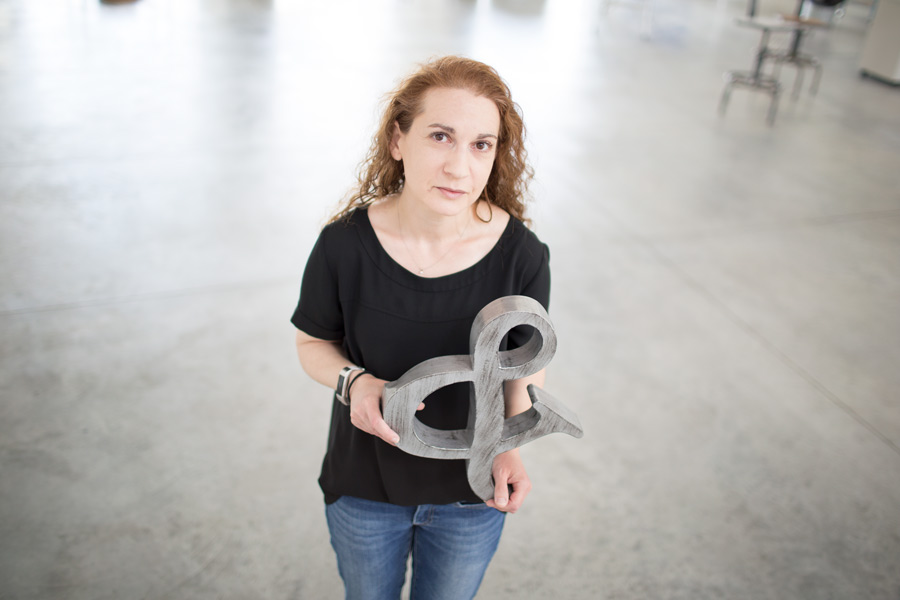Knox Stories
Two Knox Professors Named to Endowed Chairs, Professorships
Knox now boasts 21 endowed professorships and nine endowed chairs.

Office of Communications
2 East South Street
Galesburg, IL 61401


Professor of English and 2007 Young Alumni Achievement Award Winner Monica Berlin '95 has published her third book, Elsewhere, That Small. The collection, published by Free Verse Editions at Parlor Press in January, uses poetry to address the relentless nature of day-to-day experiences and ordinariness.
Berlin hopes this perspective will help people be aware of and thankful for where they are. “You can look out the same window for 20 years, and you'll never see the same thing even as it's the most ordinary view,” she said. “There's nothing dramatic about the landscape for a lot of people, and yet, almost every day, I look out [my] window and think, ‘Oh my god, it's so beautiful.’”
The following are excerpts from an interview with Berlin, transcribed as a Q&A.
Who, if anyone, are you trying to reach with your poetry?
When organizing a collection, I think about the reader a lot. When I'm writing the first draft of a poem, I am only thinking about one reader. I think it can get overwhelming trying to speak to every single person, [and] the reader shifts in the book, who I think the reader is. Some of the poems are written thinking about my child who will someday be an adult. Sometimes I'm talking to my students, sometimes to my colleagues, a very specific student or a very specific colleague. Sometimes I'm talking to my dead father, or somebody else's dead father. I do have to keep a very particular person in mind.
[This] is one of the challenges of teaching the workshop. In a workshop, you're talking to everybody, but there are three or four people who you can always count on [to read] at the level you need them to, but you can't ignore the other people in the room. You have to speak to them, too.
How would you describe the relationship between your writing and your teaching?
They're interchangeable now. The energy I use to sit with a student [and] talk about a manuscript is the same energy I use to make a poem.
It took me many, many years to navigate how to write during the term because we only have so much [energy], and then I thought, “No, that's stupid, that's wrong.” It replenishes itself. The more you talk about poems, the more you want to talk about poems, the more you read poems, the more you want to read poems. This is my slogan in workshop: the more you write, the more you write.
One of the incredible things I found in the last decade is that students will try anything. I say, “Let's just try this. See what happens.” They're courageous and brave, [and] because my students have been so willing, I thought, “Well, if they're willing, I can also be willing, right?”
So I guess the most simple answer is [that] it's this extraordinary environment, working with students in that every time they learn something about a poem, I learned something. I see them do something on the page, and I think, “I want to do that. I have to figure out how to do that.”
What advice would you give to writers who want to write poetry? What about writers who think they can’t write poetry?
Why do you think you can't? What about the poem intimidates you? And is that the poem or is it you? Is it something in your experience that prevents you from being open to it? I love the poem. I love it because it's small, because it doesn't need to be solved.
The poem doesn't have to do anything. It can just look and see. Most of the reason we don't do things is because we think we can't, and, I think like most people, I came to college thinking I would write fiction.
I did not study poetry at all as an undergrad, but when I got to graduate school, I had three [literature] classes, all rooted in poetry. Then I was in a fiction workshop, and the professor kept saying, “What are you doing? What are you doing here?” It was Robin [Metz, co-founder of Knox's Program in Creative Writing,] who said, “You've been writing poems all along. Why don't you learn your craft?” I went to another graduate program after my first and turned to poetry.
Don't think that the poem diminishes fiction; it doesn't. There's room for playwriting and screenwriting and graphic novels or whatever you're working in. We need them all. They all do different things. So, for somebody who wants to write poems and doesn't know how, just try.
More information about Berlin’s book can be found on the publisher’s website.
Published on March 12, 2020
by Sarah Lohmann '21
 "We spend so much of our time thinking about all the other places we could be, all the other things we could be doing. What happens if we just honor this place?" — Professor Monica Berlin '95
"We spend so much of our time thinking about all the other places we could be, all the other things we could be doing. What happens if we just honor this place?" — Professor Monica Berlin '95